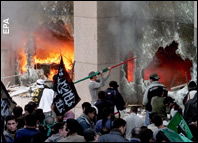|
|
The cartoons ran last September but were reprinted by other papers. They are Islamophobic, stereotypical -- the stuff of provocateurs. In trying to discredit extremists they manage to tar all Muslims. Jyllands-Posten's editors have apologized for the lapse in judgment. But the cartoons' defenders in West seem to have lost all sense of proportion by responding to the explosive protests in the Muslim world as if to stand up for Western civilization as we know it.
 | |
Muslim protesters torch Danish embassy in Beirut Feb. 5
|
Some publications in Europe have chosen to reprint the cartoons as an act of "defiance," forgetting that the use of Islam against its followers, as in the form of sexual humiliation or the desecration of the Koran, was a method used by interrogators in Abu Ghraib and Guantanamo -- something deservedly condemned the world over. Are we now to uphold this tactic as the epitome of free expression because it was employed against extremists by a free press?
In the face of the fervent hostility that the cartoons have stirred, some like France's clueless Interior Minister Nicolas Zarkozy self-righteously foist the argument that nothing is holier than freedom of expression, or at least nothing should stand in its way.
But this proposition is a myth. No one really adheres to it, not even in the most liberal quarters in the West, where there are libel and slander laws that offer protection to individuals against abuses arising from unbridled expression. No one is allowed to falsely cry "fire" in a crowded theater, and rightly so. No one is free to foment or cause imminent danger to others.
For journalists, however, punitive laws are not the only restraints that should matter. There are rules, written and unwritten, that are supposed to prevail in the newsrooms of free societies. Editors, reporters and art room professionals are trained to use these guides to proper journalistic conduct in producing their stories and commentaries.
There are no laws punishing bad taste, but journalists routinely don't write humorous articles or headlines about victims of natural catastrophes. If they do blaspheme, they know it's best to do it to one's own god and leave that of others alone. They know better than to display their wit at the expense of victims of serious crimes. Who in the West criticizes such self-restraint as an erosion of freedom of expression and of the press?
So why is the demand for basic decency and respect in the depiction of symbols sacred to millions of people so outrageous to some Western journalists and officials, especially in a world already inflamed by faith-based political tensions?
Are we now supposed to stand in ethical defense of anti-Semitic depictions of Jews by some misguided Muslim leaders and institutions? Why must tolerance of outright provocation, or the racist depictions of peoples and cultures, be the supreme test of free expression?
Certainly, in a free society, no should prescribe the use of legal prosecution against violations of common decency, respect and good taste. But that doesn't mean the media and its professionals should freely disseminate religious and ethnic insults and expect to be defended "as a matter of principle" when anger from those they offend rains upon their houses.
Comments? Send a letter to the editor.Albion Monitor
February 2, 2006 (http://www.albionmonitor.com)All Rights Reserved. Contact rights@monitor.net for permission to use in any format. |
|








